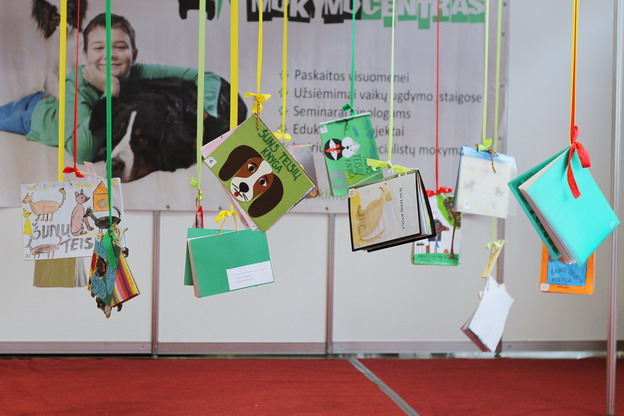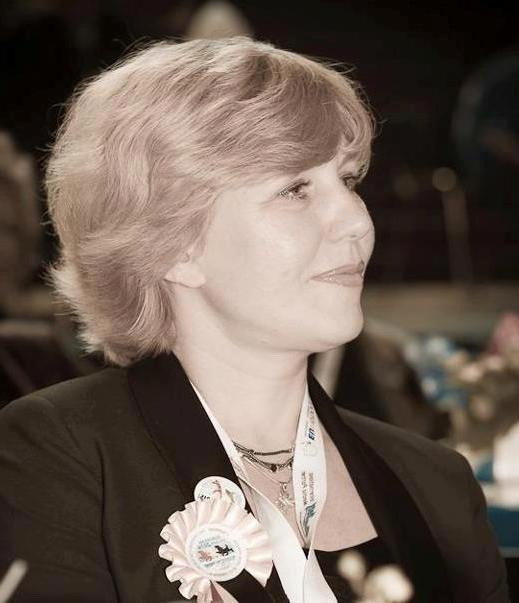Events
EDUCATION AT THE DOG SHOW: MISSION POSSIBLE

At the beginning of March the Lithuanian Kennel club hosted their first international shows of the year: Lithuanian Winner 2015 and Vilnius Cup 2015. The event took place in Vilnius and attracted a total entry of almost 1600 dogs every day.
The shows featured a considerable international participation of both exhibitors and experts coming from different European countries.
Professionals judging breed and BIS competitions, spacious exhibition hall, convenient rings and huge trading area offering a wide variety of pet supplies are just a few factors that made event enjoyable for dog world professionals.
However, showing and presentation of different breeds is just a small part of the dog world.
Bearing this in mind the organiser of the event The Lithuanian Kennel Club set the most difficult aim this time which is to satisfy the needs of different show visitors. Though high, this ambition added new colours to the event.
Indeed, modern dog shows are gradually taking a new shape – a combination of social and educational event rather than just a show.
Dog shows create a unique atmoshere where all dog lovers can come together, meet professionals, gain knowledge, share experience, take part in common activities or simply enjoy the time among enthusiasts of their hobby.
Therefore, the gathering of dog lovers is a perfect space for raising some important issues of the canine world.
One of them in our country is animal welfare, which naturally came out as a theme for the show. Hence, in addition to traditional programme, show visitors were offered a wide variety of activities carried out in cooperation with dog sport and breed clubs and animal welfare organisations.
Visitors could sign up for workshops on health issues, responsible breeding and animal welfare, those interested in pastime and sport with a dog could watch spectacular presentations of service and sporting dogs as well as breed parades and observe grooming competition.
All these activities focused on the importance to celebrate the deep bond between human and his four-legged companion.
As usual, a large part of the programme was devoted for the youngest visitors of the event. The Education Centre of the Lithuanian Kennel Club set up a special area where children and youngsters could join a great variety of activities ranging from doggy drawings and crufts, various quizzes and competitions to small seminars on specific topics.
Distinct attention at the stand was devoted to the exhibition of the works from nationwide creative competition „Dog Right Book“, aimed at raising awareness of the importance of dog welfare among children, which is a small part of the prevention programme.
The contest was greatly welcomed by school teachers, children and their parents. A group of volunteers pretaught children about the welfare of dogs, their rights and freedoms in advance and then kids together with their teachers had the opportunity to show their knowledge via creation.
Show visitors, participants, handlers, judges – they all were voting and helping to select the winners of the contest.
Though organising a dynamic, memorable and purposeful event is an enourmous challenge to any organiser, the Lithuanian Kennel Club faces it in strong believe that this is for the better future of both people and dogs.
EDUCATION OF THE YOTH – WHEN IF NOT NOW?
We expect more young people get involved with the cynology, enhance responsibility of dog owners and in doing so expect more tolerance towards our pets and our hobby“: says an enthusiastic supporter of the youth initiatives, the President of the Lithuanian Kennel Club Mrs Ramune Kazlauskaitė.
Being aware of the abundance of activities for young people and education for the general public, FCI Youth interviewed the head of the Lithuanian canine organisation about education and future perspectives for cynology.

Dog shows and breeding: this is a common concept of cynology. What does cynology mean to you?
Though the majority of dog world people are restricted to dog shows and breeding, I have always had a notion that cynology is by far more than this. Dog people do not live in show halls, they are involved in various dog sports, spend their pastime with them, live with people and among people whom they and their pets have daily contact with. Since times immemorial dogs have lived with people serving their different needs and everytime we find still new areas where our dogs could do. Paradoxically, there still exists a large number of people who do not know their best friend – a dog, which leads to misunderstandings and even seriuos problems. We cannot ignore the fact that the number of pets owned by families is rapidly growing – we have to help them by sharing our knowledge and experience.
Are there still any areas in the cynology where innovations, unconventional solutions and public-orientated projects would apply?
Despite the fact that nowadays there is plenty of information on the virtual space, people still want direct contact and „live“ communication, especially when it comes to their pets. People look for a reliable source of information. Education for the general publics is still a novelty in our country. For some reason, for quite a while it was limited to the target groups such as dog breeders, trainers, handlers, etc. Society is still divided between those in favour of dogs and those against them. As a result, we witness lists of „dangerous“ breeds, discriminating laws and regulations. All this is the outcome of a lack of education, which often results in unreasonable fear for dogs. It might sound ambitious, but I strongly believe that educational activities carried out by national canine organisations would alter society‘s attitude towards dogs. Since our activities are meant for the general publics, they are carried out by means of cooperation with animal welfare and other organisations. Therefore, we are for joint projects, both inside the country and at the international level. It would be perfect if we could collect the best practices and implement them in the FCI countries – there is no need to reinvent a bicycle, but rather use the best practices and step forward.
Step forward... In terms of cynology, Lithuania is still a very „young“ country. Could this be the reason why you have a thirst for changes and knowlledge?
Partly it could. The Lithuanian Kennel Club is a relatively young organisation. We have always strived for knowledge and continue to do so. At the same time, we understand that it is not enough to accumulate the knowledge, it is necessary to share it. The very beginning of our Education Centre was not easy. There were lots of doubts and discussions whether a cynological organisation should intrude into the field of education. At the moment, all doubts are dispersing. We are supported by the state institutions and society, we do appreciate support of the young people interested in cynology.
What is the message that you are sending to the general public?
Our main message is that people and dogs must get on well! This is to the benefit of both and we need so little – only to know dogs better and feel responsible for our pets. A crucial thing in this situation is to find a suitable channel to transmit the information, it must be available to all people.
The Lithuanian Kennel Club allocates funds for educational activities. Does your organisation get any feedback or benefit from this?
Some obvious result we hope to see in 5 – 10 years. Probably even later... However, at the moment we are enjoying a much better awareness of our organisation in the society and this implies development and strength of it. If we had aimed at profit we would not have started all this at all. Education is a slowly rewarding activity. However, we do hope for moral benefit – for more young people involved into cynology, for more responsible dog owners, for more tolerance towards our pets and our hobby.
The world is global. You are in regular contact with the heads of other canine organisations, judge at the shows and have plenty of opportunities to observe young people with their dogs. Do you feel the involvement of the young people in cynology?
Dog lovers make a very diverse community. Neither the distance, cultural differences nor language barrier is an obsticle for their communication. The number of young people in cynology is gradually growing, however, we would like to feel more drive from young people. I think a great initiative of the FCI was the establishment of FCI Youth, which encourages young people to get involved into cynological activities and at the same time in education of the general publics. Young people are the future of both our national organisations and of cynology as such and we have to invest in them now for a better future.
http://www.dogdotcom.be/en/InterviewRK.aspx
THE HIGHEST RESULT OF EDUCATION IS TOLERANCE…
The Education Centre to the Lithuanian Kennel Club has been carrying out various educational programmes about dogs aimed at young people for nearly three years now.
Therefore, a one-day project carried out on November 16th, 2014 on the occasion of the International Day for Tolerance served as a test for our activities.
The students from one of the schools in the capital city of Vilnius were offered a unique opportunity to have classes of tolerance conducted by an unusual tuitor: American Stafforshire Terrier Nora.
The uniquness of the project lies in the fact that American Staffordshire Terrier is one out of the nine breeds included in the list of „dangerous breeds“ in Lithuania.
The class started with an active discussion about discrimation of both people and animals which is reflected in the restrictions regarding certain dog breeds.
Children unanimously agreed that such actions violate not only animal but also human rights as every person should enjoy the freedom of choosing a pet of their preference and every pet deserves to have a loving home and responsible owner.
The class proceeded with the explanation of the grounds for the existence of the mentioned list, which was followed by the statement that it is not the breed but rather any irresponsibly owned dog - regardless its breed - that actually causes harm to people and other living creatures.
It was highligted that numerous countries withdrew the list of dangerous breeds giving priority to education.
The results of the survey carried out by the Lithuanian Kennel Club were presented, which revealed that 829 correspondents out of 856 were in favour of withdrawing the aforesaid list in our country.
The worldwide dog bite statistics was also discussed.

Looking at ever tail-wagging, happy and friendly Nora students admitted that previously they had unfounded fear of this dog breed, but now had a different opinion.
Obedient, active and amusing Nora encouraged futher discussions about the breed and raised many questions and sharing of experience.
Our main message – creating a pet-loving country – has reached the audience. It was concluded that all animals are equal and despite their differences have to be tolerated. They all deserve the right to live, to be looked after and loved.
The responsibility for dog‘s misbehaviour is erroneously put on various lists of dangerous breeds while it should rather be shifted on owner‘s responsibility.
The existence of such lists creates false assumption that certain dog breeds are less dangerous than others which pose no threat to the society.
Therefore, the Lithuanian Kennel Club is not indifferent to the problem and cooperates with various state institutions to solve the problems.
Our activities are supported by local governments – educational programmes for young people are welcomed at national schools and public events.
A working group also represented by our organisation for withdrawing the list of dangerous dog breeds at the state instutional level are discussing amendments to the law and this gives hope for positive changes in the future.

